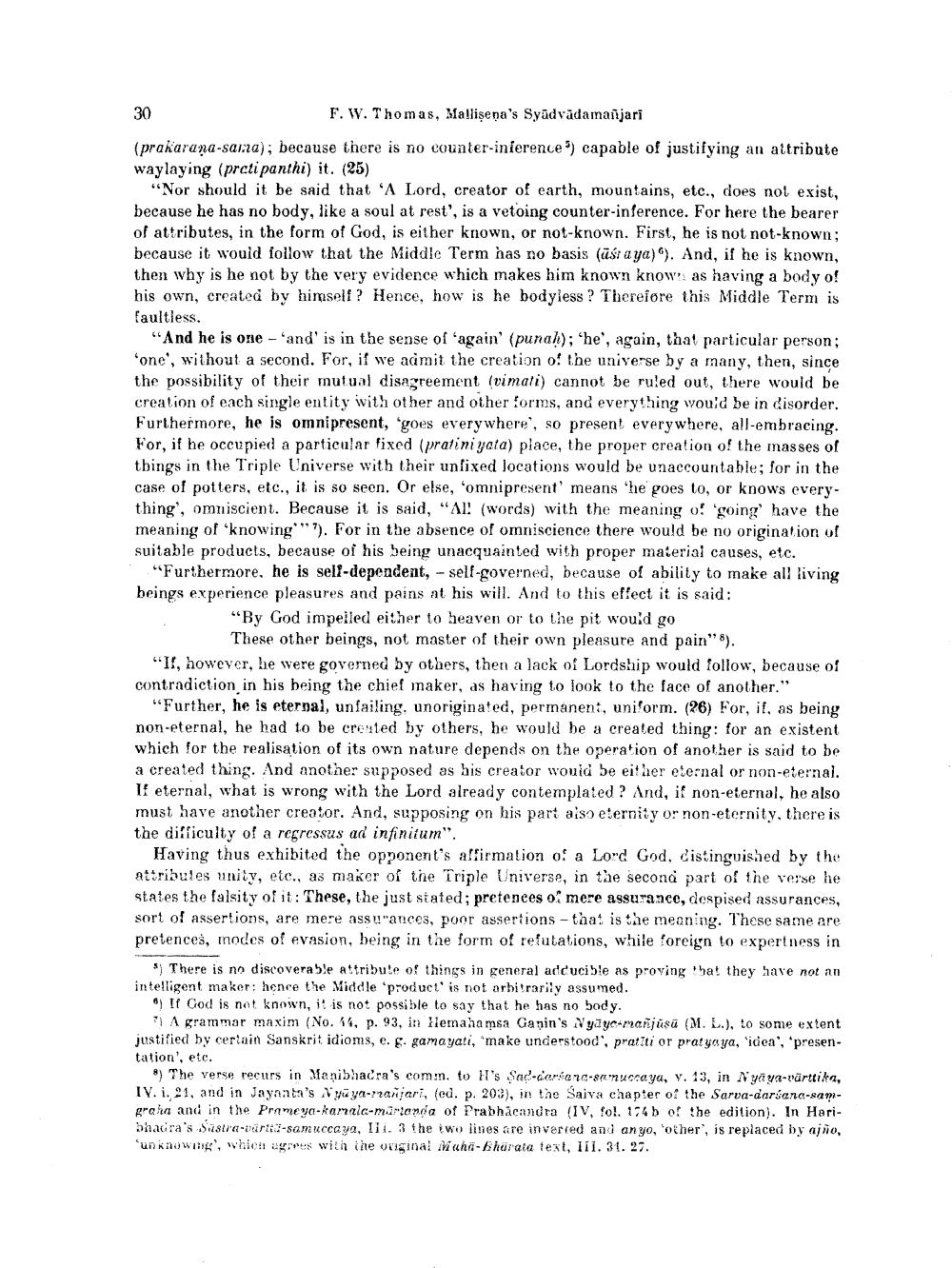________________
30
F. W. Thomas, Mallisena's Syadvādamanjari
(prakarana-sama); because there is no counter-inference) capable of justifying an attribute waylaying (prcti panthi) it. (25)
"Nor should it be said that 'A Lord, creator of earth, mountains, etc., does not exist, because he has no body, like a soul at rest', is a vetoing counter-inference. For here the bearer of attributes, in the form of God, is either known, or not-known. First, he is not not-known; because it would follow that the Middle Term has no basis (ūst a ya)'). And, if he is known, then why is he not by the very evidence which makes him known know? as having a body o! his own, created by himself ? Hence, how is he bodyless? Therefore this Middle Term is faultless.
"And he is one -'and' is in the sense of 'again' (punal); "he', again, that particular person; 'one', without a second. For, if we admit the creation or the universe by a many, then, since the possibility of their mutual disagreement (vimali) cannot be ruled out, there would be creation of each single entity with other and other forms, and everything would be in disorder. Furthermore, he is omnipresent, 'goes everywhere, so present everywhere, all-embracing. For, if he occupied a particular fixed (pratini yata) place, the proper creation o! the masses of things in the Triple Universe with their unfixed locations would be unaccountable; for in the case of potters, etc., it is so seen. Or else, 'omnipresent' means the goes to, or knows everything', omniscient. Because it is said, "Al! (words) with the meaning o! 'going' have the meaning of 'knowing"). For in the absence of omniscience there would be no origination of suitable products, because of his being unacquainted with proper material causes, etc.
"Furthermore, he is self-dependent, - self-governed, because of ability to make all living beings experience pleasures and pains at his will. And to this effect it is said:
"By God impelled either to heaven or to the pit would go
These other beings, not master of their own pleasure and pain"). "I, however, he were governed by others, then a lack of Lordship would follow, because of contradiction in his being the chief maker, as having to look to the face of another."
"Further, he is eternal, unfailing, unoriginated, permanent, uniform. (26) For, if, as being non-eternal, he had to be created by others, he would be a created thing: for an existent which for the realisation of its own nature depends on the operation of another is said to be a created thing. And another supposed as his creator would be either eternal or non-eternal. If eternal, what is wrong with the Lord already contemplated ? And, if non-eternal, he also must have another creator. And, supposing on his part also eternity or non-eternity, there is the difficulty of a regressus ad infinitum".
Having thus exhibited the opponent's affirmation of a Lord God, distinguished by the Attributes unity, etc., as maker of the Triple Universe, in the second part of the verse he states the falsity of it: These, the just stated; pretences o? mere assurance, despised assurances, sort of assertions, are mere assurances, poor assertions -- that is the meaning. These same are pretences, modes of evasion, being in the form of refutations, while foreign to expertness in
5) There is no discoverable attribute o! things in general adducible as proving that they have not an intelligent maker: hence the Middle 'product' is not arbitrarily assumed.
If God is not known, it is not possible to say that he has no body. ? A grammar maxim (No. 14, p. 93, in Hemahamsa Ganin's Nyayo-marjúsü (M. L.), to some extent justified by certain Sanskrit idioms, e. & gamayati, 'make understood', pratiti or pratyaya, 'idea, presentation', etc.
8) The verse recurs in Manibhadra's comin. to II's Sad-corianc-eamuccaya, v. 13, in Nyaya-vārtika, IV. i.91, and in Jayanta's Nya ya-rranjari, (ed. p. 203), in the Saiva chapter of the Sarva-darśanc-samgraha and in the Prameya-kamala-mamanda of Prabhacandra (IV. fol. 1745 of the edition). In Haribhadra's Sustra-vert-samuccaya, li. 3 the two lines are in verred and anyo, 'other', is replaced by ajno, "unknown, which agrees with the onginal Mahabharata text, lil. 31. 27.




